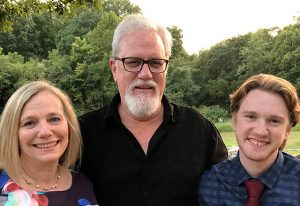Jay Smith has three angels protecting him at Speaker’s Corner in London’s Hyde Park, as he debates hostile Muslims about the authenticity of Islam’s holy book, its history, and its holy site.
Smith has named his angelic protectors Barry, Harry and Larry.
The first time Barry showed up was when Smith was getting kicked on the ground by angry Muslims who were incensed by his supposed blasphemy. A huge black man appeared and laid on top of him and took the blows while Smith was unconscious, according to the police.
“The police finally got to me and were able to pull me out,” Smith relates on a YouTube video. “I asked the police, where is this black man. I’d like to thank him. He’s disappeared. They had no idea who he was.”
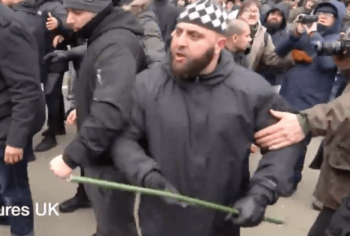
Smith believes Harry and Larry hang out in the oak trees above, smiling at him. He has never seen them, but a Muslim saw them in the trees one day during a debate. Smith made up the names for his “angels.”
Smith got a doctorate – the only one of its kind in the world – as an Islamic polemicist, which is the opposite of apologetics, the defense of one’s faith.
He was born in Northern India to second-generation missionaries in the northern part of the Indian subcontinent, the largest concentration of Muslims in the world, with 650 million.
As a student, he debated Muslims at the Woodstock Missionary School in Landour, in the Himalayan foothills.
“They were very aggressive. Any discussion we had, it was always the Muslims against me. That’s why I have no fear of the Muslims,” Smith says. “I love them. They’re very engaging.”
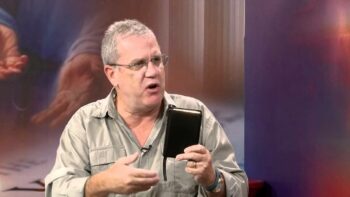 He came to America in 1971 for college. Truth be told, he was relieved to leave the chapter behind of conflict with the Muslims.
He came to America in 1971 for college. Truth be told, he was relieved to leave the chapter behind of conflict with the Muslims.
But then in 1981, he and his wife, Judy, a missionary kid from Kenya, attended a one-day seminar during their post-grad studies. They learned that only 1,500 missionaries were being sent worldwide among a Muslim population of 800 million (at the time).
“Worldwide we were sending only 2% of missionaries to the fastest-growing religious group on Earth,” he learned. “That was like a slap in the face.”
Appalled, he turned to Judy. “What in the world are we doing wrong? Why are we sending only 2% to the one religion that is attacking us at our foundation, the one religion that is growing faster than any other, the one religion that is taking over the world?”
The couple asked their missions board to send them to the Muslim world. They wound up in Senegal, where they established the first church to the Wolof people.
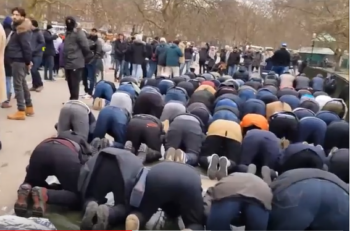
After four years, they were looking for their next assignment.
“We’re having a real problem up here in London,” he was told.
Smith scratched his head. London was not in the so-called 10/40 Window, the longitudinal lines where Islam spread and maintains its stronghold, where evangelism is almost always illegal. He asked, Why London?
London is filled with immigrants from Pakistan, India, Bangladesh (because they were former British Colonies, they could immigrate to England) who were preaching vociferously about Islam and working hard in London. Today, London is 15% Muslim and has a Muslim mayor.
Usually, 10 or so Islamic preachers gathered daily in Speaker’s Corner of Hyde Park to extol the ways of Islam.
“In the 1990s Speaker’s Corner was very violent. This is before Muslims became peaceful,” Smith says. “There was no narrative of peace back in the 1990s. That only came after 9/11 when the narrative changed overnight.”
 These were “radical” Muslims, ones who wanted to purify Islam of all aberrations and reformulations and return to the roots of the Koran and the teachings of Mohammad. “These were my people,” Smith says.
These were “radical” Muslims, ones who wanted to purify Islam of all aberrations and reformulations and return to the roots of the Koran and the teachings of Mohammad. “These were my people,” Smith says.
They were like his old school buddies who debated heatedly. He felt a kinship, a sentimentality and ultimately a calling from God.
So, the missionary from Senegal became the missionary in London. He went daily to Speaker’s Corner to debate these Muslim preachers at 4:00 p.m.
When he took a class on the History of Islam in 1994 at the School of Oriental and African Studies under Dr. G. R. Hawting, his brain exploded. Through historical criticism, he learned the weaknesses of Islam’s history, holy book and Mecca.
He learned that the earliest written documents of the life, sayings and application of Muhammad came 200-300 years after his life, written down by disciples sometimes thousands of miles away from the actions, reputedly relayed to them through the oral tradition.
 He learned that the earliest inscriptions in Muslim buildings do not cite the Koran. He learned that the 10 earliest mosques point to Petra instead of Mecca, that the Koran describes the prophet’s city as having a river and olive trees (true of Petra, not Mecca) and that Muhammad had interactions with all kinds of people who lived around Petra.
He learned that the earliest inscriptions in Muslim buildings do not cite the Koran. He learned that the 10 earliest mosques point to Petra instead of Mecca, that the Koran describes the prophet’s city as having a river and olive trees (true of Petra, not Mecca) and that Muhammad had interactions with all kinds of people who lived around Petra.
There were many more things he learned.
“These were hugely problematic for Islam,” he says. “This is devastating for Islam.”
Eagerly, he took the information to the streets and tried it out in debates with Muslim preachers. The academic work upended their traditional story, and he wanted Muslims to “come home” to the truth.
 “I don’t want to destroy their faith. Because God bless them, they already believe in God, in Heaven and Hell, the prophetic line, that there is a beginning and end, and the problem with sin,” Smith explains.
“I don’t want to destroy their faith. Because God bless them, they already believe in God, in Heaven and Hell, the prophetic line, that there is a beginning and end, and the problem with sin,” Smith explains.
“We have commonalities. I just want to bring them home, to the book that has passed the test of every question we are asking of the Koran. Don’t give up God, just come on home. Their faith in God is beautiful but they’ve got the wrong god, the wrong history, the wrong book.”
Armed with academic studies about the origins of Islam, Smith went to Speaker’s Corner. He was making a name for himself and touching the hearts of many Muslims. His was not the soft sell approach. It was Paul’s approach of vigorous debate, he says.
One day, a Trinidadian former professional boxer convert to Islam got off his ladder, came over to Smith, and attacked him in 1995.
“He just slammed me, and I went flying,” Smith says. “I went unconscious. I don’t know what happened after that. What I was told was about 60 Muslims came and started kicking me on the ground.
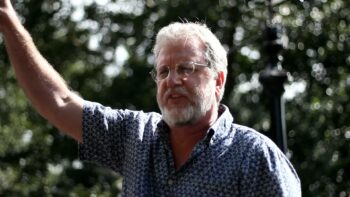 “Then a big black man came and laid on top of me and took all the blows. The police finally got to me and were able to pull me out. I asked the police, where is this black man. I’d like to thank him. He’s disappeared. They had no idea who he was.”
“Then a big black man came and laid on top of me and took all the blows. The police finally got to me and were able to pull me out. I asked the police, where is this black man. I’d like to thank him. He’s disappeared. They had no idea who he was.”
Smith was undeterred. He went back to Speaker’s Corner, despite warnings from police that he would be killed.
Seeing his resoluteness to return, police urged Jay to at least use a ladder, so they could keep an eye on him from afar and rescue him.
From then on, Smith brought a small two-step kitchen ladder to elevate himself above the crowd. He brought a second one for anyone who wanted to debate him.
He kept at it.
 The second time he got throttled was in 2011 (or 2012) when a group that appeared to be Middle Easterners attacked him after he finished and stepped down from his ladder.
The second time he got throttled was in 2011 (or 2012) when a group that appeared to be Middle Easterners attacked him after he finished and stepped down from his ladder.
“They had never heard this kind of criticism before. You understand how damaging it could be for the Muslims,” Smith says. “Suddenly a big black put his arms around me and said, ‘Let’s go Jay’ and took the blows for me. When I turned around to thank him, he had disappeared.”
Now the second time, Smith figured that it was an angel. “I call him Barry.”
Sometime later, a Muslim asked him about the black men up in the oak trees watching over him as he debated. They were smiling at him, the man reported to him afterward over tea.
Jay conjectured that they too were angels, and called them Larry and Harry.
For 25 years, Jay has debated Muslims at Speaker’s Corner in London. He has continued his studies and now holds a doctorate in Islamic Polemics.
To learn more about a personal relationship with Jesus, click here
Related articles: 37 Korans, Mrs. Apostate , Indonesia, Queers for Palestine?, Nagmeh Panahi, Hatun Tash, David Wood.
About this writer: Michael Ashcraft pastors a church in the San Fernando Valley.

